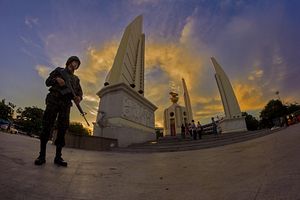On his way to meetings in Europe this week, Thai Prime Minister Prayuth Chan-ocha, who still seems to believe all reporters will simply accept his word without question as if they were in the military, stopped to briefly lecture journalists. Reporters have been asking Prayuth about the junta government’s roadmap for a return to electoral democracy, a question that, like all inquiries, seems exasperating to Prayuth. In the course of his lecture, Prayuth basically let slip that, though he had earlier promised that elections would be held by October 2015, that date might have been overambitious, and Thailand actually might not have elections before 2016. Prayuth left open the possibility that even 2016 might be too soon for elections, or that elections might not happen at all.
As Reuters reported:
“I outlined a road map. The election must come with a new constitution and eleven reform areas,” said Prayuth [to reporters]. “Everything depends on the road map so we must see first if the road map can be completed. Elections take time to organize,” he added, giving no further details.
Prayuth’s fudging on elections reminded me of a famous New Yorker cartoon about a businessman trying to avoid a meeting. (The cartoon was also the title of New Yorker cartoon editor Bob Mankoff’s recent memoir.)
But for most people in Thailand, Prayuth’s suggestion is not so funny. The clear suggestion that elections might be put off, possibly indefinitely, means that Prayuth and his allies are becoming more comfortable in power, more assured that they can root out support networks for Puea Thai and Thaksin Shinawatra (and possibly the Crown Prince), and less worried that Thailand needs to hold elections soon to please the international community and the majority of Thais who support electoral democracy.
I disagree with some Thailand observers who argue that Prayuth’s desire to return to extreme 1950s-style authoritarian Thai rule will soon spark a significant public response. Although the Thai public certainly is far more educated, assertive, and desiring of democratic elections than it was in the 1950s, when old ideas of hierarchy still held great sway, many Thais also simply are tired of years of political conflict. They also are fearful of this era in which the king could die at any moment, and cowed by the military’s extremely tough post-May response to any dissent. I don’t expect there to be significant blowback against Prayuth’s slow election timetable, even if it stretches into 2016 or 2017 while also revamping Thai legislative institutions to make them less representative.
That doesn’t mean I think most Thais want this kind of elite and anachronistic rule that Prayuth champions, or that the Obama administration should accede to Prayuth’s rule. For instance, the United States should take the opportunity of Ambassador to Thailand Kristie Kenney’s departure to maintain only a chargé d’affaires in Bangkok as a sign of diplomatic displeasure. It just means that I think that, for now, Prayuth can stall and stall on elections without serious consequences.
Joshua Kurlantzick is a fellow for Southeast Asia at the Council on Foreign Relations. This post appears courtesy of CFR.org.

































